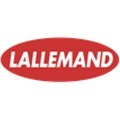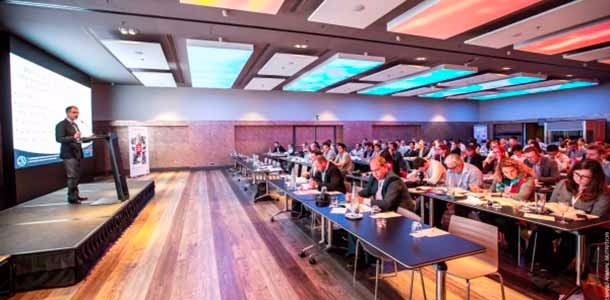 The swine industry has changed a lot over the past few years and so have the challenges faced by producers. Meeting after meeting, we have seen evolution of the scope for LEVUCELL SB applications to accompany these challenges: from the sow to the piglets, from feed digestion to immunity… This edition was no exception, with fresh insights into effects of the probiotic yeast on three major aspects: weaning stress in piglets, alternative to antibiotics usage in feed, and heat stress in swine, with insightful presentations by international speakers. Some of the latest LEVUCELL SB results were shared by our research partners from University of Nottingham and University of Milan. Dr Labussière from INRA Pegase, in France, presented preliminary results of a very innovative study on heat stress which opens the door to new applications for Lallemand’s probiotic yeast, showing benefits on resistance to intense stress and feeding behavior.
The swine industry has changed a lot over the past few years and so have the challenges faced by producers. Meeting after meeting, we have seen evolution of the scope for LEVUCELL SB applications to accompany these challenges: from the sow to the piglets, from feed digestion to immunity… This edition was no exception, with fresh insights into effects of the probiotic yeast on three major aspects: weaning stress in piglets, alternative to antibiotics usage in feed, and heat stress in swine, with insightful presentations by international speakers. Some of the latest LEVUCELL SB results were shared by our research partners from University of Nottingham and University of Milan. Dr Labussière from INRA Pegase, in France, presented preliminary results of a very innovative study on heat stress which opens the door to new applications for Lallemand’s probiotic yeast, showing benefits on resistance to intense stress and feeding behavior.


Once again, this event was a real platform for exchanges and networking around swine nutrition, research and management practices in a convivial environment and a fantastic setting over the roofs of Gaudí’s city! To complete the experience, IRTA research platform dedicated to monogastric nutrition (Mas de Bover), opened the doors of its facilities to our international visitors and presented its ongoing research programs.
Thanks to all the speakers and participants who attended the meeting and see you again for the 8th International LEVUCELL® SB Technical meeting!

Weaning: a stress for the piglet and its microbiota
Prof. Jose Francisco Perez from University of Barcelona, launched the seminar by demonstrating how early stages strongly impact future performance. The swine nutritionist also presented various dietary strategies to reduce the impact of post-weaning stress on swine performance. For him, several factors affect future performance. 1) With sow hyperprolificacy, lightweight piglets have become more frequent. They will not perform as well in the nursery as heavier piglets and show higher mortality rates. 2) Weaning is a critical period for the piglet, an important source of stress and potential health and performance issues, linked in particular to reduced feed intake. According to Prof. Perez, we should focus our efforts on the post-weaning period. This was not contradicted by Prof. Ken Mellits from University of Nottingham in the U.K., who took one look deeper into the piglet digestive tract and, by using next generation gene sequencing technology, showed how weaning affects the piglet digestive microbiota communities. 3) In recent years, the excessive use of antimicrobials in piglet feed has been questioned, and Prof. Mellits shows how their systematic use has impacted digestive microbiota diversity and leads the way to higher infectious risks. Today, efforts are to be made to find acceptable alternatives. According to Dr. Perez, there is no magic bullet, and a successful strategy to reduce the impact of weaning stress comes from a subtle balance between genetic, nutrition and animal environment and management.
In this context, he discussed some dietary strategies such as fine-tuned calcium and mineral supplementation, the use of zinc oxide and its associated risks (emergence of resistant bacteria). Dr. Perez concluded that “we have to act on a multi-factorial stand point on both the sow and the piglet”. As an illustration of probiotics’ effects to help balance the gut microbiota and reduce weaning stress, Dr Mellits showed results of LEVUCELL SB studies, indicating that the probiotic helps maintain microbiota diversity around weaning as well as following antibiotic treatment.
The present and future on antibiotics in piglets’ feed: alternatives are possible
Dr. Miguel Angel Higuera, DVM, from the Spanish Association of Swine Producers is engaged in a European working group on swine health and welfare. If antibiotic growth promoters have been banned in Europe since 2006, their prophylactic use is still accepted. Today, consumers concern for antibiotic-free food products and the risk that antibiotic resistant pathogens pose to human health have fueled the need for real alternative strategies. Dr. Higuera demonstrated the reality of the problem in terms of public human health “each year, 25,000 persons die because of multi-resistant pathogens,” and gave a clear overview of European present and future regulations on medicated feed, expected to come into action early 2017. However, in his opinion, it is important to keep in mind that feed, which represents 38% of antibiotics used by the sector, is not the only source of the problem and efforts should be made in any direction. He illustrated his presentation by different local initiatives. For example, Denmark, who seems to lead the way in terms of antibiotic reduction, has achieved close to a 50% reduction in nearly two decades and is still working on it. He concluded that maintaining animal health is vital for the competitiveness of European pig production. Prof. Savoini from University of Milan in Italy, brought the nutritionist’s point of view. He focused his talk on dietary alternatives to antibiotics in piglets’ feed, such as probiotics, prebiotics (MOS), organic acids, plant extracts, etc. According to his work, S. cerevisiae boulardii I-1079 is one of the most promising alternatives, thanks to its proven ability to modulate the piglet microbiota, promote intestinal health and gastrointestinal structure, and its well demonstrated mode of action. He showed some promising data indicating that LEVUCELL SB could represent a great tool to maintain growth performance in the absence of antibiotics. A 2015 trial also indicates that the live yeast is compatible with zinc oxide and antibiotics and is able to act in synergy with zinc oxide to improve growth performance. In conclusion, it is necessary to take a more global approach to the issue, not just based
on post-weaning feeding but looking at sow and piglet feeding.
Impact and modulation of heat stress in swine
Climate changes and the growth of swine production under a hot climate (in Spain, for instance, but also China and other countries) indicate that heat stress will be a growing issue in swine production. Dr. Etienne Labussière from INRA Pegase Saint Gilles in France, described the impact of heat stress on pig performance: the bigger the animal, the more sensitive to heat stress. Heat stress is considered a risk from around 26 to 28°C. While feed intake is reduced, the animal uses extra energy to eliminate body heat and growth is affected. Dr Labussière presented the methods used at a state of the art experimental facility at INRA to study energy balance and metabolism in swine under fixed ambient temperatures. This innovative system was used to conduct an in-depth study on the effects of LEVUCELL SB supplementation on thermal heat acclimatization and energy balance in finishing pigs. To date, not all data have been fully analyzed yet, but the preliminary results presented in Barcelona are very promising. They indicate that the probiotic yeast had a positive effect on growth performance under both thermoneutral (22°C) and heat stress (28°C) ambient temperature. However, the live yeast supplementation had a greater impact under heat stress as it was able to compensate for the negative impact of heat on pig growth, through a positive effect on feeding behavior. Dr. Labussière explained: “the live yeast helped the pig to cope with heat stress through an increased number of meals.” Yet another indication of the ability of LEVUCELL SB to reduce the detrimental impact of stress and even its effect on eating behavior. Such findings are very promising as they complement ongoing research studies on the relationship between the microbiota and the gut-brain axis conducted in both animals and humans by many researchers at the moment.
Once again, this thought-provoking event was a real platform for exchanges and networking around swine nutrition, research and management practices in a convivial environment and a fantastic setting in Gaudí’s city. To complete the experience, the IRTA research platform dedicated to monogastric nutrition (Mas de Bover), opened the doors of its facilities to the international visitors and presented its ongoing research programs in swine nutrition.
June 9, 2016 - Lallemand


